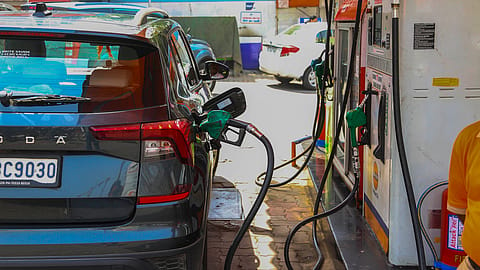Govt says no decision on banning diesel vehicles
Consultation with various stakeholders on the report are yet to be initiated, says the Ministry of Petroleum and Natural Gas

The Ministry of Petroleum and Natural Gas said the government is yet to accept the report by the Energy Transition Advisory Committee (ETAC), which proposed a ban on diesel-run four-wheelers in cities with a population of more than a million by 2027.
ETAC has made wide-ranging and forward-looking recommendations for a shift to low-carbon energy and has a 'futuristic outlook', the petroleum ministry says in a tweet, adding that India is committed to Net Zero by 2070.
The suggestions of ETAC relate to multiple ministries and a range of stakeholders including states, the oil ministry says.
"Consultation with various stakeholders on the report are yet to be initiated. No decision has yet been taken on #ETAC recommendations," it adds.
The oil ministry's panel, headed by former petroleum secretary Tarun Kapoor, further said that no diesel-powered city buses should be added from 2024 in urban areas.
Recommended Stories
"CNG may continue till 2035, but diesel buses for city transport should not be added from 2024 onwards," said ETAC.
India has the fourth-largest car market globally, but electric vehicle penetration is currently only around 1%, according to Moody's Investors Service.
(INR CR)
Global battery electric vehicle sales were around 8 million, with 65% of these in China, Moody's said, adding that Europe represented nearly 20%.
Moody's expects various incentives announced by the Indian government to drive an increase in EV penetration, Fortune India reported last month.
"We expect various government incentives will drive an increase in EV penetration. These include consumer incentives, production-linked incentives for advanced battery storage to drive local cell manufacturing, goods and services tax (GST) rate cuts, and other state level subsidies," the rating agency said.
The pace of increase in EV sales and increase toward the government's target of 30% by 2030 will also depend on the country’s charging infrastructure, and consumers' readiness to switch to EVs from traditional ICE vehicles, it added.
As per Moody's, Tata Motors retains an early mover advantage in the battery electric vehicles (BEV) market in India, with an 85% share for the period April through December 2022. Its presence through 250 dealers across 165 cities, and with close to 4,300 charging points, has already allowed the company to sell some 50,000 EVs. Tata plans to increase its EV lineup from four models to 10, by March 2026.
Tata Motors has also partnered with Uber in electrifying their ride-hailing services across Delhi NCR, Mumbai, Kolkata, Chennai, Hyderabad, Bengaluru and Ahmedabad.